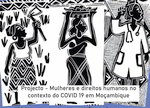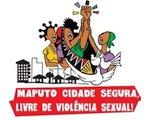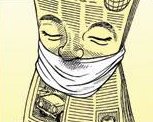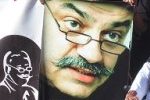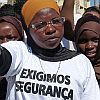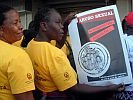Prosecutor Removed for Defending the Law?
Published in Outras Vozes nº 28, supplement, November 2009
News of the removal of a young public prosecutor in Mabote district by local elites raises doubts.
In the past two months (May, June 2009) there has been a number of disturbing news items about the removal of a young public prosecutor in Mabote district, at the request of local elites and supported by the provincial governor. It appears that in this district, which had never had a prosecutor or a court before, measures taken by the representative of the Attorney General’s Office in an attempt to restore order, were not well received.
Information about the case came to the public’s attention through the following newspaper articles:
- 20 May, Notícias – “Prosecutor given ’24 hours’?!…”
- 30 May, Notícias – “Mabote population denounces abuse of justice… and accuses the local prosecutor of abuse of power”
- 3 June, Notícias – “Prosecutor’s actions should be a lesson”
If the reports are true, there are some serious situations that warrant our attention. First of all, however, we should explain the reasons given for discontent with the young prosecutor, Manuel Machaze:
- He intervened when pupils were being made to work in the private fields of the school’s headmaster and teachers, disguised as carrying out national guidelines on school production.
- He prevented people without a license from driving vehicles, some of which belonging to the State.
- In court he tried to “protect women and children from domestic violence”.
Because of this attitude, the prosecutor is accused of being “an obstacle to development”, of being “arrogant” and of following the letter of the law, ignoring “the reality on the ground”.
These accusations were presented in a meeting with the provincial governor, where the prosecutor was violently attacked by local elites calling themselves “the people of Mabote”. In reality, those who were pointing the finger are civil servants (including teachers) or local “economic agents”, according to the term used by the journalist.
At the end of the meeting the governor is quoted as saying that he is the supreme magistrate of the province and there is no one else above him.
Our analysis of the situation, which may not be complete as we only have the information in the above mentioned newspaper articles, leads us to point out the following:
- The governor’s statement as reported in the newspaper is a shocking and disturbing violation of the independence of the judicial power, which is the guarantor of any democracy. He should bear in mind that since the 1990 Constitution, and the separation of the legislative, executive and judicial powers, conditions have been created for stronger protection for citizens’ rights.
- If it is true that the governor also immediately removed the prosecutor, this is an unacceptable interference by the political power in the administration of justice system and a violation of constitutional principles because, no matter what the reasons for removing the prosecutor, only the Attorney General’s Office, in the person of the Attorney General, has the power to decide on the professional work of state attorneys/public prosecutors.
- The “excesses” of which the prosecutor is accused would suggest that he was trying to ensure compliance with the law and that his biggest “fault” is not having allied himself with the local gentry. He is reported as saying: “No-one is above the law. The prosecutor must be bad, have no friends”.
- The fact that the prosecutor interfered in cases of domestic violence, provoked strong reactions by the “stubborn and demanding Mabote population” who alleged: i) “no one should get involved in a row between husband and wife”, ii) “I paid brideprice for this woman with my own money, I gave her parents a herd of cattle, so that she would serve me”.
The young prosecutor graduated in 2006 from the most recent course for state attorneys/prosecutors in the Legal and Judicial Training Centre (LJTC) that has trained young law graduates in this field and also judges. The purpose of the training is to ensure that justice is administered with respect for the law and the defence of human rights.
What is happening now is that Manuel Machaze is being punished for trying to carry out the mandate with which he was entrusted, even if this meant confronting local elites. That they should rise up against him is understandable, because they had existed for many years without being constrained by the law. What cannot be explained is that the authorities did not support the prosecutor, and allowed the rule of the powerful in Mabote district to continue.
The absence of any public position defending the prosecutor shows complicity and connivance with violation of the Constitution by political and administrative authorities in Inhambane province, and is a very bad example for current and future prosecutors, prosecutors and judges. We are calling for the results of the investigation, which we assume is underway to obtain information about the real situation, to be made public.
Finally, we would like to reiterate that the reason we felt obliged to denounce this case is, as it always has been, the desire to help build the rule of law.
* * *







 Information in English
Information in English